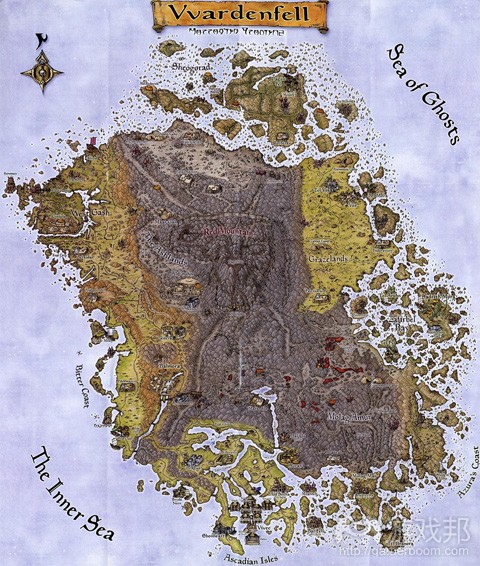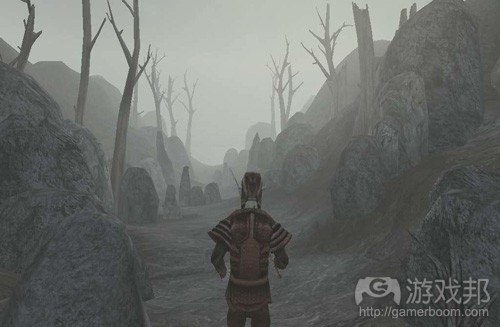探讨开发世界设计问题之Bethesda模式
作者:Jack Monahan
Rockstar和Bethesda都制作开放世界游戏,但二者最明显的区别就是,前者做的是动作游戏,后者做的是RPG。Rockstar的《侠盗猎车手:圣安地列斯》(《GTA:San Andreas》)显然不太认真考虑角色机制,考虑到RPG的传统——角色创造和角色扮演,很容易就能看出这个游戏世界是多么与众不同。
游戏不仅让作为玩家的我命名和控制我的角色外观,还假设我选择了道德立场和对角色类型的偏好:战士、盗贼或法师或这些类型的亚类型。
作为玩家的我们可以假设游戏世界的大多内容是适应不同玩家的能力和操作方式的。我们扮演角色Tommy、CJ或Niko,但他们的故事不是我们的;Bethesda的游戏传统RPG特点在角色培养和角色扮演上体现得更明显。游戏期望由作为玩家的我们来做决定。
我要解释动作游戏的角色对比RPG角色的显著差别是因为,我认为其各自的世界的设计与玩家选择大有关系。动作游戏的角色有一套少量的动作,但通常分辨率非常高;而RPG的动作很多,但以损失分辨率为代价,特别是在强调动作的战斗机制中(游戏邦注:尽管有例外,如混合类型的游戏《质量效应》系列)。
这里的重点是,Niko无法与这个世界的其他角色互动,除了攻击。他可能玩游戏、找商人买食物或装备、约会或雇用妓女,但这些只是在剧情上发生的。与他的女朋友、兄弟走在街道上或经过警察身边,我们允许被动行为或暴力发生。这就是为什么与区域更小便细节更丰富的游戏相比,《侠盗猎车手:自由之城》虽然模拟得很逼真,但看起来那么单调。在前者中,我们可能不会遇到像在《自由之城》中的那么多市民和路人,但可以保证我们与他们当中的大多数人能至少产生一些简单的、非暴力的互动。
我不太喜欢幻想背景,特别是动作和战斗机制做得不好的幻想游戏就更难给我留下深刻印象了,我认为Bethesda的游戏就有这个弱点。所以与本文的第一部分一样,我也要引用一篇文章,这次是来自网络学者Liesmith的:
“我认为如果你要讨论Bethesda的模式,那就不能不提《上古卷轴》系列三步曲——《匕首雨》、《晨风》和《湮没》。
《匕首雨》确实很有新意,玩家能在游戏世界中做许多事。但玩家感到不知所措,并且特定的城镇+地下城的模式很令人乏味,因为地图是随机生成的。但是道具用法——玩家捕捉灵魂,各个灵魂都有特别的功能,可以添加到道具上,真是了不起,太有野心了。
《晨风》的体验更加多样化,玩家能做的最好的事就是不需要任务指引,单纯地探索废墟或墓穴,寻找宝剑或需要翻译矮人语的书。同时,任务也很有趣,特别是因为你得自己寻找任务,而不是等着任务发放给你。一开始玩家会觉得有点可怕,但那是因为他们还不习惯这么大尺度的自由。另外,游戏内的“快速旅行”的方式也很丰富,有步行跳蚤、传送法术或船只。
《匕首雨》相比,《湮没》走了一条完全相反的路线,这是它失败的地方。为了照顾缺少方向感的新玩家,游戏使一切都变得平淡无奇了,甚至引入任务箭头,简直是侮辱玩家的智商。快速旅行也大大简化了。总之在各个方面,开发者似乎都选择了保险的做法。”
还有很多内容可说,但我最欣赏他介绍了游戏世界的复杂度和相应地强调游戏应该尊重玩家克服和探索的意愿。这好像与我在游戏中经历的东西相符。
《匕首雨》的世界非常庞大,但也许被过大的野心所累;《晨风》采取平衡措施,即缩小游戏世界,但突出了地点的特异性;《湮没》的世界更小了,但图像更加逼真、操作难度也降低了。流行的说法是,《晨风》的平衡性最刚好,但《湮没》更流行。
通常来说,我认为以尊重玩家按自己的方式来玩游戏的标准来说,Bethesda设计开放世界的方式比Rockstar的更好。尤其是Liesmith所说的:
在《晨风》中,你可以杀死任何人。这真是相当野蛮的自由度,但很重要。有些人如果死了就会破坏剧情,在你杀死守护神Vivec或其他什么人之后,游戏才会告诉你。但游戏允许你继续玩下去,因为主要任务并不重要。
我认为这是一个重要的元素,因为它代表了游戏世界的核心特征和设计师对玩家的尊重。
《GTA》给我最深刻的感受是,自由游戏/剧情任务的分支让我仿佛成为一个无拘无束的小孩,不用为自己的所作所为承担任何后果,除非我决定“循规蹈矩”地做剧情任务,随着时间发展,我会因为进度而获得奖励:可以探索更多城市、获得更多保障和金钱等。
《晨风》把重要的故事角色置于复仇心较重的玩家的掌控之中,体现了游戏对玩家才智的信任,以及对他们渴望创造自己的体验的支持。如果我玩游戏时把杀掉所有遇到的角色作为追求,那么我得经过非常长的时间才能达到这个目标。这是其他经典RPG如《辐射》的卓越特征。这是否仅仅反映了我们喜欢游戏中的大屠杀?或者表现了游戏设计师的诚意?
对我而言,设计师相信玩家知道杀死发放任务的角色的后果就是,他们可能最终无法抵达黄金城堡。或者也许他们会达到,但不是以他们老实做任务的那种方式来达到。但设计师不是考虑这些游戏破坏者的举动并果断地禁止,而是认为“任务NPC也是肉眼凡胎”对玩家来说是有意义的;游戏中可能存在另一种聪明的通关办法对玩家来说是重要的。
归根到底,游戏对玩家表现出多大的尊重,通常取决于玩家对游戏怀有多少敬意。作为玩家,游戏给我多少空间来创造自己的乐趣?(本文为游戏邦/gamerboom.com编译,拒绝任何不保留版权的转载,如需转载请联系:游戏邦)
Open world issues Part 2: the Bethesda model
by Jack Monahan
Comments from yesterday’s article prompted me to write a second update to discuss Bethesda’s approach to open world games, since they’re the other major player and take a markedly different approach worth discussing. We’ll save the final discussion for where exactly we might like to pitch our own vision of an “open world” style game for a third installment.
The most obvious difference between Rockstar and Bethesda’s approach to open world games is that the former makes action games and the latter makes RPG games. Where GTA has flirted memorably with light character mechanics with GTA:San Andreas, it’s easy to see how far different the worlds are because of the RPG traditions of character creation and role assumption.
Not only am I naming and controlling the appearance of my character, the game assumes I am choosing a moral stance as well as preference for archetypal playstyles: warrior, rogue, or wizard, in the broad strokes, and all the flavors and subclasses in between.
As players we can assume much of the game/world content has been built to accommodate this spectrum of different player abilities and approaches. Tommy, CJ, or Niko we pick dress up clothes for but their stories are not ours; the traditional RPG focus of Bethesda’s games assume a far greater stake in both role-creation and role-playing. We’re expected to make decisions.
I explain the painfully obvious aspects of an action game character vs. an RPG character because I think it’s important here in how their respective worlds are designed relative to player input. An action character has a set, narrow verb set but with generally greater resolution in those verbs, whereas RPGs take a broader approach, with a loss of fine resolution typically in action-style combat mechanics (though it’s interesting here to note the hybrid forms in Mass Effect 1/2).
One key concern here is that Niko has no method to of interaction with other characters in the world, one to one, other than violence. He may play games, pay vendors for food or clothing, go on dates or hire a prostitute but these are only available contextually. Walking on the street with his girlfriend, his cousin, or past a police officer we are allowed either passivity or violence. This is why the otherwise incredibly well realized world of Liberty City seems so flat by comparison to much smaller-scoped, but more richly detailed games. We may not encounter nearly as many citizens of whatever fantasy realm as pedestrians in Liberty City, but we can be assured we have at least some shallow, non-violent interactions with most of them.
I am less an admirer of most fantasy settings; lesser still impressed when games lack an emphasis on finely tuned movement and combat mechanics, which I think has arguably been a weak point in Bethesda’s games. So as with Part 1 I will use a post quote to enable discussion, this time from Internet scholar Liesmith:
I think if you talk about the Bethesda model you should talk about the Daggerfall -> Morrowind -> Oblivion spectrum. Daggerfall is really innovative and provides a ton of stuff for the player to do, but it’s overwhelming and specific towns + dungeons are bland because of the random generation. Still stuff like the item rules, where you trap souls and each soul has specific properties which it adds to your items, that’s awesome and really ambitious.
Morrowind is a varied experience with really cool shit to do, and the best stuff is exploring a sweet ruin or tomb that no quest pointed you to, and finding a great sword or a book in dwarvish that needs translating. At the same time the quests are a lot of fun, especially since you have to seek them out rather than having them thrust upon you. It’s a little scary at first though because gamers aren’t used to so much freedom. Also fast travel is resolved in-game, with silt striders, teleport spells or boats.
Then Oblivion is a game that fails in exactly the opposite way as Daggerfall. In order to ease the new gamer’s fear of the unknown and lack of direction, they made everything bland and introduced an insulting quest arrow. Fast traveling is similarly dumbed down, and at every turn it feels like they made the safe choices.
There’s a lot to unpack here, but I appreciate him introducing a basic spectrum to talk about complexity of the world and correspondingly the emphasis each game places on the player’s own will to conquer or explore. This seems consistent with what I have experienced of each title.
Daggerfall is almost punishingly vast in scope, perhaps crippled by overarching ambition for its period; Morrowind is a balancing act of reduced scope but greater specificity in how locations are realized; Oblivion narrows scope further for better graphical fidelity as well as ease of play considerations. Popularly speaking, it seems that Goldilocks picked Morrowind, though Oblivion was by no means unpopular.
Generally speaking I find that Bethesda’s approach to open world design is a lot more winning than Rockstar’s, in terms of response to a player’s desire to play the game by their own rules. Least of all because of this sort of thing, again from Liesmith:
Also in Morrowind, you can kill everybody. This is a pretty crude measure of freedom but it’s important. Some people will break the plot if they die, and it will tell you that you have done so after you kill the god Vivec or whoever. But it lets you keep playing because the main quest isn’t a big deal.
I think this is an important element because of what it means about the overall character of the world and the designer’s esteem of the player.
One of my greatest issues with the GTA experience is that the free play/story mission bifurcation makes me feel as though I am a child allowed to play in a consequence free environment until I decide to “behave” and do the story missions, and over time I’m rewarded with progress in the game world: more of the city becomes available, safehouses, money, etc.
A game like Morrowind, by placing even important story characters “in the world” and at the mercy of the vengeful player suggests greater trust in the player’s intelligence and desire to shape his own experience. If I begin my game and I decide I would like nothing better to do than to exterminate every character I come across, I could go a very long way toward this goal. This is a lauded feature of other classic RPG franchises, such as Fallout. Is this simply revealing how much we value mass-murdering in a game? Or is it an act of good faith by the designer?
To me it says the designers realize the player understands that if they kill the guy handing out all the quests, they’re probably not going to be able to get to the golden castle high on the ridge that’s at the end of all of this. Or maybe they will, but not the way they would have if they’d done the quest. But instead of considering this a gamebreaker and flatly disallowing it, it assumes that it’s meaningful to the player that even quest NPCs are mortal; that there might be clever alternate solutions, ways to game the system.
In the end the game’s respect for me as a player ends usually spells how much respect I have for the game in return. How much leeway as a player to do I get toward making my own fun?
How important is that to you as a player? Watch for part three for further discussion. (source:designreboot)










































 闽公网安备35020302001549号
闽公网安备35020302001549号